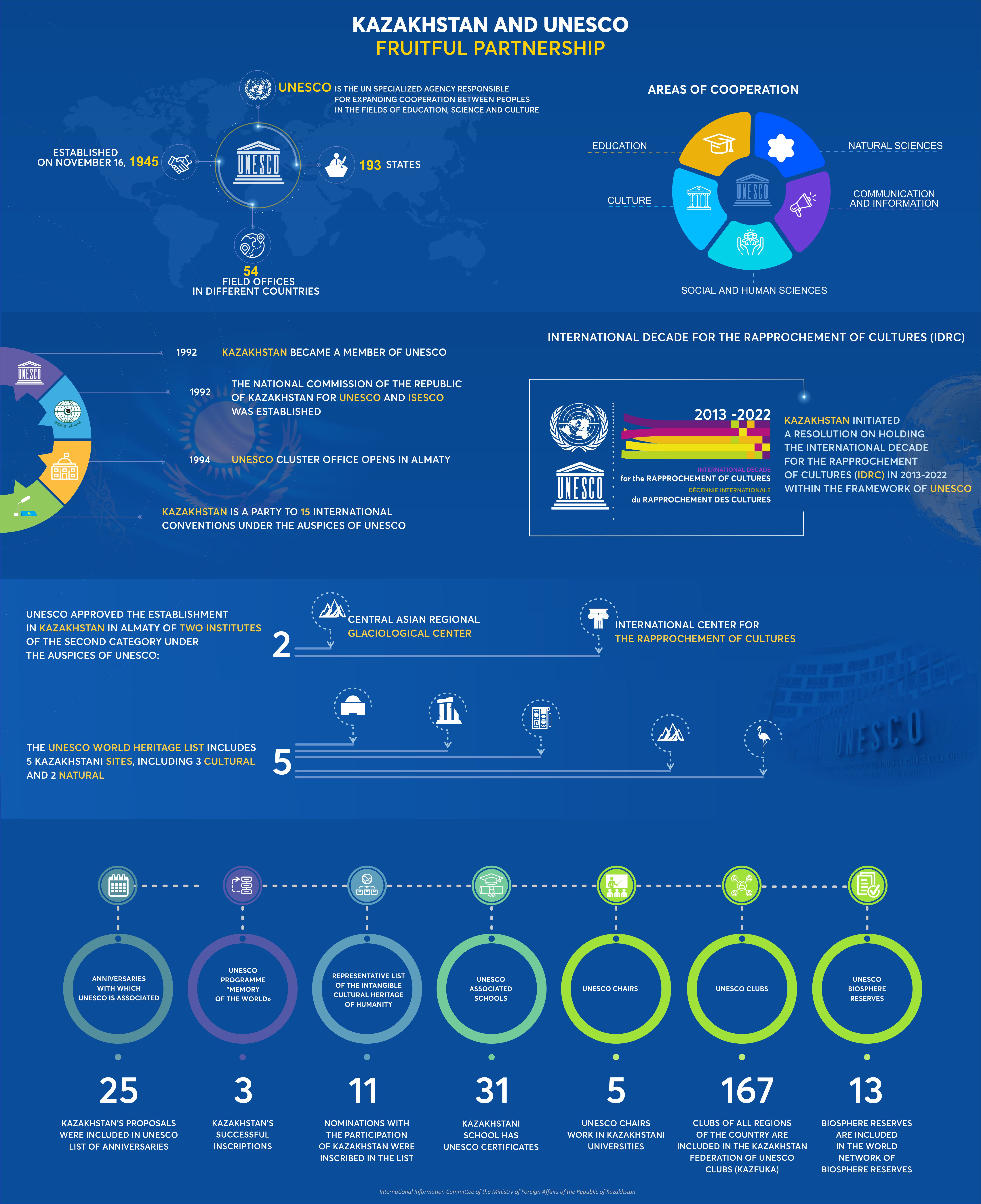On the occasion of the 30th anniversary of the accession of the Republic of Kazakhstan to UNESCO

The Republic of Kazakhstan was accepted as a member of the United Nations Educational, Scientific and Cultural Organization at the plenary meeting of the 46th Session of the UN General Assembly on 22 May 1992.
Becoming a full-fledged party to the international relations system and pursuing its own active foreign policy, Kazakhstan has traditionally attached major importance to the comprehensive development of cooperation in science, culture and education.
In 1993, Kazakhstan established its own National Commission of the Republic of Kazakhstan for UNESCO, which identified priority areas for cooperation with this specialized agency. In August 1995, a Memorandum of Cooperation between Kazakhstan and UNESCO was signed and an Agreement between the Government of Kazakhstan and UNESCO on the establishment of a UNESCO Office in Almaty was signed, defining their main areas of cooperation.
Kazakhstan is the party to 15 international conventions under the aegis of UNESCO, and takes active part in the implementation of its strategic documents.
Since Kazakhstan acceded to the 1972 Convention Concerning the Protection of World Cultural and Natural Heritage, five sites, including the Mausoleum of Khoja Ahmed Yasawi in Turkestan, have been inscribed on the World Heritage List. In 2013-2017, Kazakhstan actively contributed to the functioning of the World Heritage Committee.
Kazakhstan has consistently and steadily expanded its participation in UNESCO’s structures and programs. From 1997 to 2001, Kazakhstan was a member of the Executive Board of UNESCO. Currently, Kazakhstan is a member of the Intergovernmental Council of the International Hydrological Program and the Intergovernmental Council of the International Program for the Development of Communication for 2021-2025.
In June 2018, at the 7th Session of the General Assembly of States Parties, our country was elected a member of a key UNESCO body, the Committee of the 2003 Convention for the Safeguarding of the Intangible Cultural Heritage (ICH) until 2022. This mandate enabled to use the Committee’s platform for the exchange of experience and further training of Kazakh experts in this field. So far, 11 nominations from Kazakhstan were included to the UNESCO Representative List of ICH of the Humanity.
Kazakhstan’s initiatives in the area of cultural dialogue to promote peace and preserve universal values for present and future generations are welcomed and supported by all members of the organization. Thus, at the 67th Session of the United Nations General Assembly, a resolution on Promotion of Interreligious and Intercultural Dialogue, Understanding and Cooperation for Peace was adopted, the main element of which was the declaration of an International Decade for the Rapprochement of Cultures, initiated by Kazakhstan, for the period 2013-2022.
In the field of science, cooperation with UNESCO is carried out mainly through four dedicated national committees working on UNESCO global programs, namely the International Hydrological Program, Man and the Biosphere, Bioethics, and UNESCO Global Geoparks. In November 2019, Kazakhstan was elected to the International Coordinating Council of the Man and the Biosphere Program until 2023.
The UNESCO World Network of Biosphere Reserves includes 13 Kazakh sites.
Based on the Agreement between the Government of the Republic of Kazakhstan and UNESCO, ratified in 2021, the International Centre for the Rapprochement of Cultures under the auspices of UNESCO is actively operating in Almaty. The main purpose of the Centre is to coordinate and intensify the intercultural dialogue of scholars and experts in the field of sustainable cultural development, as well as studies into theory and practice of intercultural dialogue throughout history and in the contemporary times.
During the 36th Session of the UNESCO General Conference in 2011, it was decided to establish a Central Asian Regional Glaciological Centre under the auspices of UNESCO at the Institute of Geography in Almaty.
A priority for Kazakhstan is a work on UN SDG 4 «Ensure inclusive and equitable quality education and create lifelong learning opportunities for all».
In Kazakhstan 31 schools are certified as UNESCO Associated Schools.
There are five UNESCO Chairs in the country: at Al-Farabi Kazakh National University (journalism and sustainable development), Abai Kazakh National Pedagogical University (pedagogy), Ramazan Suleimenov Institute of Oriental Studies (Science and Spirituality) and at the Kazakhstani-German University (Water Management).
The Kazakhstan Federation of UNESCO Clubs (KazFUCA) includes 167 clubs and brings together more than 19,000 active members in all over the country.
The UNESCO’s list of anniversaries has featured, throughout the three decades of its membership, 25 nominations from Kazakhstan, including the 150th anniversary of Akhmet Baitursynuly and the 100th anniversary of Roza Baglanova commemorated in 2022.
The multifaceted cooperation between Kazakhstan and UNESCO at all levels promotes a variety of international cultural exchanges, the implementation of the objectives of the UNESCO Constitution in the fields of education, science and culture, and the successful implementation of projects in all major areas of the Organization’s activities.